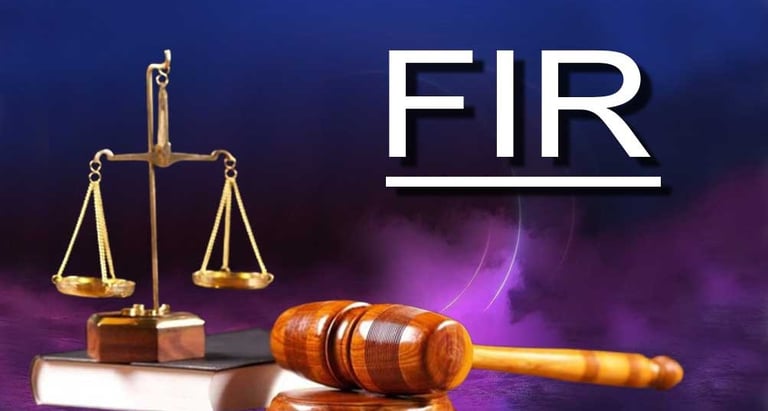AdVocate harshit Sachar | chamber no: 617 | district courts ludhiana | 2817 gurdev nagar ludhiana | ✆+91 7889228369
Understanding FIR: The First Step in a Criminal Case
What is an FIR, and how does it affect the process of a criminal case?
CRIMINAL LAW
Advocate Harshit Sachar
8/7/20251 min read


An FIR (First Information Report) is the very beginning of a criminal case in India. It is a document prepared by the police when they receive information about the commission of a cognizable offence. Understanding the significance of FIR is essential for anyone involved in a legal process—whether as a complainant, accused, or witness.
What is a Cognizable Offence?
Cognizable offences are serious in nature (e.g., murder, rape, robbery), where the police can register the case and start an investigation without prior approval from the magistrate. Non-cognizable offences (e.g., defamation, public nuisance) require court permission.
Who Can File an FIR?
Anyone who has knowledge of the commission of a cognizable offence can approach the police station and file an FIR. It can be the victim, a witness, or any third party.
Rights of the Accused
Once an FIR is lodged, the criminal process begins. If a person is named as an accused, they have the right to legal representation, protection from unlawful arrest, and the right to seek anticipatory bail if they apprehend arrest. Legal assistance from a criminal advocate is crucial during this stage to ensure that due process is followed.
Can FIR Be Quashed?
Yes, in some cases, a person named in the FIR can approach the High Court under Section 482 of the CrPC to quash the FIR, especially if the case appears false, baseless, or based on personal vengeance.
Role of the Police and Court
After an FIR is registered, the police investigate the matter and file a charge sheet before the court if sufficient evidence is found. The trial follows, where both prosecution and defense present their case. The court decides based on evidence and witness testimonies.
Understanding FIR helps common people make informed decisions in criminal cases. Whether filing or defending a case, legal awareness is the first step to justice.
Services
Sachar Law Firm – Advocate, Lawyer, Attorney & Solicitor Services in India | Ludhiana, Punjab.
Expert legal advice across various practice areas - Civil, Criminal, Divorce and Matrimonial, Consumer and Corporate laws, Bail Matters, Property Contract Disputes, Insurance claim disputes, cyber Crime cases, Cheque bounce, Family Divisions, Arbitration. Bail Matters, Electricity Board Cases, Appeals before Session court Ludhiana, Marriage certificate, Court Marriage, Succession Certificate Accident Claim (MACT), NRI Legal Matters, NRI Property Matters.
“Get in Touch with Sachar Law Firm”
Quick Links
© 2025. All rights reserved.
Advocate Harshit SACHAR
Legal Blog
2817, 1st Floor , Gurdev Nagar, Ludhiana, Punjab -141001
Address: Office Cum Res:
Corporate Liquidation and Recovery Litigation
☎️ 0161 7965410
